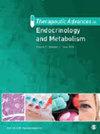肾移植受者的钠-葡萄糖协同转运蛋白2抑制剂(SGLT2i):证据是什么?
IF 4.6
3区 医学
Q2 ENDOCRINOLOGY & METABOLISM
Therapeutic Advances in Endocrinology and Metabolism
Pub Date : 2022-01-01
DOI:10.1177/20420188221090001
引用次数: 11
摘要
最近的几项随机对照试验(RCT)证明了钠-葡萄糖协同转运蛋白2抑制剂(SGLT2i)在改善本地肾病患者肾脏和心血管预后方面的广泛临床应用。2021年4月,达格列嗪成为第一个被美国食品药品监督管理局(FDA)批准用于治疗慢性肾脏疾病(CKD)的SGLT2抑制剂,无论其糖尿病状况如何。然而,尽管这些药物在本土肾病患者中因其心血管和肾脏保护作用而备受赞誉,但对SGLT2i在肾移植环境中的安全性和有效性知之甚少。SGLT2i发挥其益处的许多机制在肾移植受者中与CKD患者一样有效或更有效。然而,出于安全考虑,移植受者被排除在所有大型随机对照试验之外,临床医生和患者都在怀疑这些神奇药物的益处是否大于风险。在这篇综述中,我们将讨论SGLT2i在肾移植中发挥有益作用的已知机制、这些药物的潜在益处和风险,最后,我们将探讨已发表的关于SGLT2i在肾移植受者中使用的文献的最新发现,并为未来的研究提出潜在的方向。本文章由计算机程序翻译,如有差异,请以英文原文为准。
Sodium-glucose cotransporter-2 inhibitors (SGLT2i) in kidney transplant recipients: what is the evidence?
Several recent randomized controlled trials (RCTs) have demonstrated the wide clinical application of sodium-glucose cotransporter-2 inhibitors (SGLT2i) in improving kidney and cardiovascular outcomes in patients with native kidney disease. In April 2021, Dapagliflozin became the first SGLT2 inhibitor to be approved by the Food and Drug Administration (FDA) for the treatment of chronic kidney disease (CKD) regardless of diabetic status. However, while these agents have drawn much acclaim for their cardiovascular and nephroprotective effects among patients with native kidney disease, little is known about the safety and efficacy of SGLT2i in the kidney transplant setting. Many of the mechanisms by which SGLT2i exert their benefit stand to prove equally as efficacious or more so among kidney transplant recipients as they have in patients with CKD. However, safety concerns have excluded transplant recipients from all large RCTs, and clinicians and patients alike are left to wonder if the benefits of these amazing drugs outweigh the risks. In this review, we will discuss the known mechanisms SGLT2i exploit to provide their beneficial effects, the potential benefits, and risks of these agents in the context of kidney transplantation, and finally, we will discuss current findings of the published literature for SGLT2i use in kidney transplant recipients and propose potential directions for future research.
求助全文
通过发布文献求助,成功后即可免费获取论文全文。
去求助
来源期刊

Therapeutic Advances in Endocrinology and Metabolism
Medicine-Endocrinology, Diabetes and Metabolism
CiteScore
7.70
自引率
2.60%
发文量
42
审稿时长
8 weeks
期刊介绍:
Therapeutic Advances in Endocrinology and Metabolism delivers the highest quality peer-reviewed articles, reviews, and scholarly comment on pioneering efforts and innovative studies across all areas of endocrinology and metabolism.
 求助内容:
求助内容: 应助结果提醒方式:
应助结果提醒方式:


